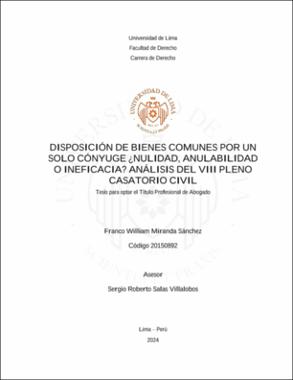| dc.contributor.advisor | Salas Villalobos, Sergio Roberto | es_PE |
| dc.contributor.author | Miranda Sanchez, Franco William | es_PE |
| dc.date.accessioned | 2024-04-22T16:28:46Z | |
| dc.date.available | 2024-04-22T16:28:46Z | |
| dc.date.issued | 2024 | |
| dc.identifier.citation | Miranda Sanchez, F. W. (2024). Disposición de bienes comunes por un solo cónyuge ¿nulidad, anulabilidad o ineficacia? análisis del VIII pleno casatorio civil [Tesis para optar el Título Profesional de Abogado, Universidad de Lima]. Repositorio Institucional de la Universidad de Lima. https://hdl.handle.net/20.500.12724/20271 | es_PE |
| dc.identifier.uri | https://hdl.handle.net/20.500.12724/20271 | |
| dc.description.abstract | El presente trabajo de investigación nace de un problema jurídico recurrente en la judicatura nacional. El artículo 315 del Código Civil sostiene que, para la realización de actos de disposición, se requiere de la intervención de ambos cónyuges; sin embargo, no indica cuál es la consecuencia jurídica aplicable en caso de inobservancia. La doctrina, así como diversas sentencias judiciales sobre el particular, señalan tres soluciones posibles: la nulidad, la ineficacia y la anulabilidad. Producto de lo heterogéneo de las posturas, el VIII Pleno Casatorio Civil tenía la importante misión de establecer la consecuencia aplicable al caso
concreto. La Corte Suprema adopta la tesis de la nulidad; por lo tanto, para todos aquellos casos en los que uno de los cónyuges disponga de manera unilateral un bien social, se aplicará la sanción de la nulidad.
En ese orden de ideas, el presente trabajo busca brindar un aporte a la discusión que se sigue sobre el particular. Es claro que el VIII Pleno Casatorio Civil es de observancia obligatoria por las salas civiles nacionales; no obstante, no es menos cierto que la decisión adoptada ha sido ampliamente discutida por la doctrina. Dicho esto, hemos procurado realizar un análisis de la institución del matrimonio, de la inexistencia, invalidez e ineficacia
del acto jurídico. Asimismo, se lleva a cabo un estudio de la representación y la ratificación. A partir del estudio de las figuras antes señaladas, terminamos con el análisis del VIII Pleno Casatorio civil. Se estudia la postura mayoritaria de la Corte Suprema y el voto en discordia. Además, se hace un análisis de la posición de los amigos de la corte y de los precedentes vinculantes que nacen con esta sentencia casatoria. Finalmente, y sobre la base de lo expresado hasta aquí, brindamos nuestra posición personal, sosteniendo que la ineficacia es la sanción aplicable para los actos de disposición de bienes sociales realizados de manera unilateral. | es_PE |
| dc.description.abstract | The present research work arises from a recurrent legal problem in the national judiciary. Article 315 of the Civil Code states that, in order to carry out acts of disposition, the intervention of both spouses is required. However, it does not indicate which is the applicable legal consequence in case of non-observance. The doctrine, as well as various court rulings on the matter point out three possible solutions: nullity, ineffectiveness and voidability. As a result of the heterogeneous positions, the VIII Plenary Civil Cassation Court had the important mission of establishing the legal consequence applicable to the specific case. The Supreme Court adopts the thesis of nullity; therefore, for all those cases in which one of the
spouses unilaterally disposes of a social asset, the sanction of nullity will be applied. In this order of ideas, the present work seeks to offer a contribution to the discussion
that follows on the matter. It is clear that the VIII Pleno Casatorio Civil is of mandatory observance by the national civil chambers; however, it is no less true that the decision
adopted has been widely discussed by the doctrine. Having said this, we have attempted to analyze the institution of marriage, the non-existence, invalidity and ineffectiveness of the legal act. Likewise, a study of representation and ratification is made. From the study of the aforementioned figures, we end with the analysis of the VIII Plenary Civil Cassation. The majority position of the Supreme Court and the dissenting vote are studied. In addition, an analysis is made of the position of the friends of the court and the binding precedents that are born with this cassatory sentence. Finally, and on the basis of the
above, we offer our personal position, arguing that ineffectiveness is the applicable sanction for the acts of disposition of corporate assets carried out unilaterally. | es_PE |
| dc.format | application/pdf | es_PE |
| dc.language.iso | spa | es_PE |
| dc.publisher | Universidad de Lima | es_PE |
| dc.rights | info:eu-repo/semantics/restrictedAccess | es_PE |
| dc.source | Repositorio Institucional - Ulima | es_PE |
| dc.source | Universidad de Lima | es_PE |
| dc.title | Disposición de bienes comunes por un solo cónyuge ¿nulidad, anulabilidad o ineficacia? análisis del VIII pleno casatorio civil | es_PE |
| dc.type | info:eu-repo/semantics/bachelorThesis | |
| thesis.degree.discipline | Derecho | es_PE |
| thesis.degree.grantor | Universidad de Lima. Facultad de Derecho | es_PE |
| thesis.degree.level | Título profesional | es_PE |
| thesis.degree.name | Abogado | es_PE |
| dc.publisher.country | PE | es_PE |
| dc.subject.ocde | https://purl.org/pe-repo/ocde/ford#5.05.00 | |
| renati.author.dni | 75105203 | |
| renati.advisor.orcid | https://orcid.org/0009-0002-3278-5052 | |
| renati.advisor.dni | 07909316 | |
| renati.juror | Maquilón Acevedo, Elizabeth | es_PE |
| renati.juror | Montero Ordinola, Sergio | es_PE |
| renati.juror | Salas Villalobos, Sergio Roberto | es_PE |
| renati.level | http://purl.org/pe-repo/renati/level#tituloProfesional | |
| renati.type | https://purl.org/pe-repo/renati/type#tesis | |
| renati.discipline | 421016 | |
| ulima.cat | OI | es_PE |




